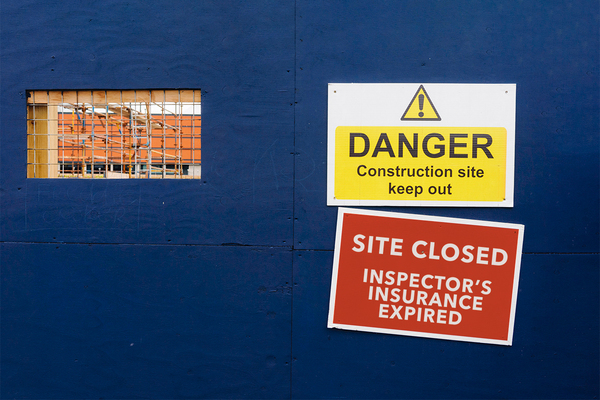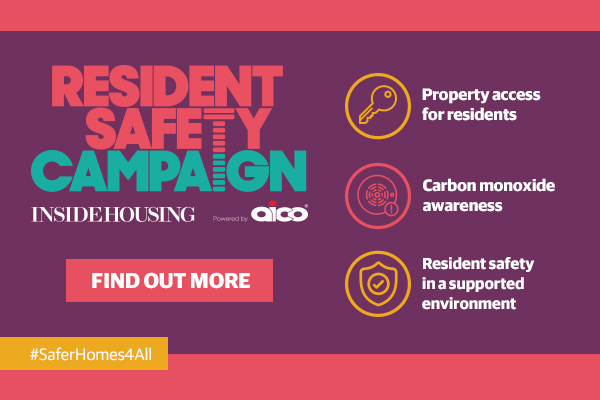You are viewing 1 of your 1 free articles

The building control sector is on the cusp of disaster and the government must act now
As a post-Grenfell insurance crisis continues to grip the sector, Paul Timmins warns that private building control inspectors face an existential threat that demands urgent action
Readers of Inside Housing will already be aware of the problems that private building inspectors, or approved inspectors, are facing in renewing their statutory insurance.
They will know that this may be the biggest immediate danger threatening the operation of the UK construction industry, with the potential for thousands of job losses and delays to tens of thousands of crucial projects across the country.
Allow me to provide a brief introduction to this topic. To operate in the UK, approved inspectors require professional indemnity and public liability insurance.
This means that if any faults are found with projects signed off by private inspectors, consumers – from homeowners to large commercial developers – are able to claim for necessary repairs. If approved inspectors cannot secure insurance, they are forced to cease trading.
It is right for the government to protect consumers in this way. However, the terms for this insurance are set by the Ministry of Housing, Communities and Local Government (MHCLG), and have barely changed in decades – while the construction sector has been through boom, bust and boom again.
This lethargy has now come to a head and is a serious issue for the industry. Insurers are wary of providing cover for approved inspectors after the Grenfell Tower fire and subsequent cladding ban, which has undermined confidence in the entire industry. The last insurer providing cover for approved inspectors pulled out of the market earlier this year, leaving dozens of approved inspectors unable to renew their insurance terms.
Three major companies have already ceased trading. Aedis, a major approved inspector based in the North East, is the biggest to go. This has left more than 10,000 major projects on hold and local authorities – who are not required to protect consumers in this way – are struggling to provide the capacity to pick up the pieces.
Dozens more are expected to lose cover in the coming weeks, which will see more job losses and more delays. There may also be a knock-on effect on small developers that, operating on small margins and unable to complete their work, may also have to cease trading. Make no mistake – unless the government acts now, the sector is on the cusp of disaster.
Listen to a podcast on the building control issue:
The influx of new ministers to arrive at the MHCLG provides the government with an opportunity to refresh its strategy, with a new secretary of state in Robert Jenrick, and a new housing minister in Esther McVey, arriving last month.
The Association of Consultant Approved Inspectors has been engaging closely with government on this issue – recently meeting Mr Jenrick’s predecessor as secretary of state, James Brokenshire, at a round table along with other industry representatives.
Sustainable, longer-term solutions put forward by the government will of course be welcomed by the sector. However, unless action is taken now to ensure its immediate survival, there may not be a private building control sector (as we know it today) to benefit from such reforms.
The new minister must now ensure that positive discussions between the industry and the government are put into urgent action, either through changes to the terms of insurance or through government backing for approved inspectors while the industry develops its own long-term solution.
With ambitious pledges around housing and infrastructure to meet – before we even begin to discuss Brexit – it cannot be in the best interests of the department and these new ministers to do nothing while a sector that employs thousands of people faces such an existential threat.
“Make no mistake – unless the government acts now, the sector is on the cusp of disaster”
If the government is serious about meeting these targets for housebuilding in the UK, presiding over a problem such as this within the construction industry – that is so easily preventable – is something that simply cannot happen.
While in recent days some individual approved inspectors have begun to make small steps of progress with insurers on a one-to-one basis, we are nowhere near the structural change needed to ensure that this situation never arises again.
The time for talk is over – the government must take responsibility for action now or wake up in several weeks’ time to a crisis that it could have prevented.
Paul Timmins, chief executive, Association of Consultant Approved Inspectors
Inside Housing and Aico competition: tell us about your resident safety comms initiative
Inside Housing has launched a campaign with fire and carbon monoxide alarm specialist Aico to promote best practice in resident safety and to enable registered social landlords to provide widespread safe places to live.
Enter our competition and win the chance to have your resident comms initiative showcased in Inside Housing
Inside Housing would like to hear about a safety campaign that identified and tackled issues surrounding residential safety, engaged residents, and which was executed with measured success.
In particular, we would like to hear about an outstanding communications initiative that has been completed.
This competition is open to everyone and it is free to enter.
How to enter
When writing your submission for our judges, you should include:
- The objectives of the campaign
- How the activity was undertaken and by who, including examples to tell your story of how it reached residents, and how they were involved in the decision-making. This can include video content, social media links or copies of flyers, posters or information booklets
- The impact and demonstrated effectiveness of the campaign, including results and how they were measured
- Why it matters. Tell us about the crucial bigger picture that this campaign has addressed, whether this is the long-term objectives of your organisation or the wider goals of your team
Prizes
The judging panel will choose the three best entries. Each of the three winners will receive:
- A profile of the project in Inside Housing, including an interview with the team
- An invitation to take part in the resident safety roundtable hosted by Inside Housing
- Promotion across Inside Housing’s social media channels
By submitting your entry, you are agreeing for Inside Housing to receive your contact details out of legitimate interest. If you wish for this not to happen, please contact: sonal.kapur@oceanmedia.co.uk











